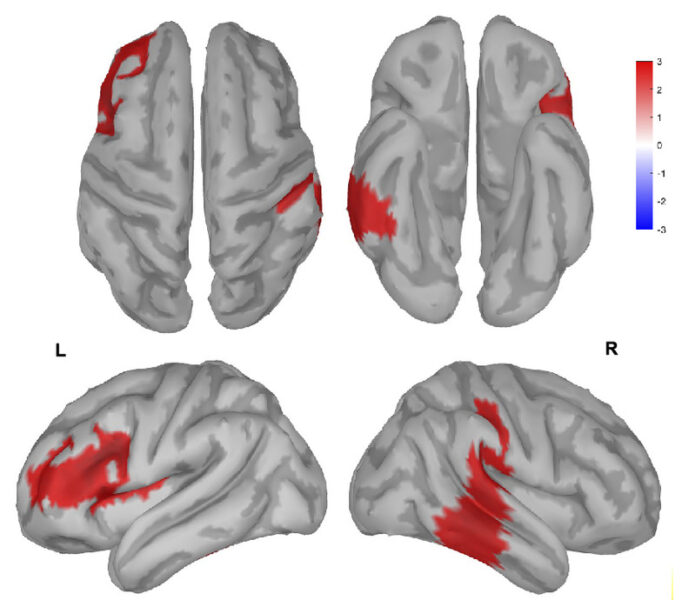Summary: New research reveals that prolonged mental fatigue can trigger sleep-like brain activity in areas responsible for self-control, leading to more aggressive behavior. The study found that people subjected to demanding mental tasks for an hour showed significantly less cooperative behavior, with peaceful cooperation dropping from 86% to 41% compared to non-fatigued participants.
Journal: Proceedings of the National Academy of Sciences, November 11, 2024, DOI: 10.1073/pnas.2404213121 | Reading time: 4 minutes
When Brain Areas Need a Break
Your brain has a curious way of showing fatigue – parts of it actually start displaying sleep-like activity while you’re still awake. This phenomenon, known as “local sleep,” occurs particularly during mental exhaustion and may explain why tired people sometimes make poor social decisions.
To test this connection, researchers at the IMT School of Advanced Studies Lucca designed an experiment combining neuroscience with economic games. They subjected participants to mentally demanding tasks for an hour – four times longer than typical studies – to amplify potential effects.
Games Reveal Social Impact
After the fatigue-inducing tasks, participants played economic games requiring varying degrees of cooperation and competition. One key test was the “hawk and dove” game, where players must share limited resources in a hostile environment, choosing between collaboration or aggressive behavior.
The results were striking. Peaceful cooperation plummeted from 86 percent in the non-fatigued group to just 41 percent in the fatigued group. Electroencephalograms of 44 participants revealed that fatigued individuals displayed sleep-like brain waves in their frontal cortex – patterns completely absent in the control group.
Real-World Implications
“These results provide a scientific bases to popular wisdom that suggests to ‘sleep on it’ before making a decision, by showing that metabolic exhaustion within certain brain areas does affect our decision-making processes,” explains Pietro Pietrini, Director of the Molecular Mind Lab at IMT School.
The findings have broad implications for daily life. “Overall, these findings have important implications for multiple situations in everyday life, including economic transactions and legal agreements, as they demonstrate that when the brain is ‘tired’ we may make choices that go even opposite to our own interest,” Pietrini adds.
Glossary
- Local sleep: Sleep-like brain activity occurring in specific regions while awake
- Frontal cortex: Brain area responsible for decision-making and self-control
- EEG (Electroencephalogram): Tool for measuring brain electrical activity
- Delta waves: Type of brain waves typically seen during sleep
Quiz
- How much did peaceful cooperation drop in fatigued participants?
Answer: From 86% to 41% - How long did participants perform mentally demanding tasks?
Answer: One hour - What type of brain activity appeared in fatigued participants?
Answer: Sleep-like waves in the frontal cortex - How many participants underwent EEG monitoring?
Answer: 44 participants
Enjoy this story? Get our newsletter! https://scienceblog.substack.com/


